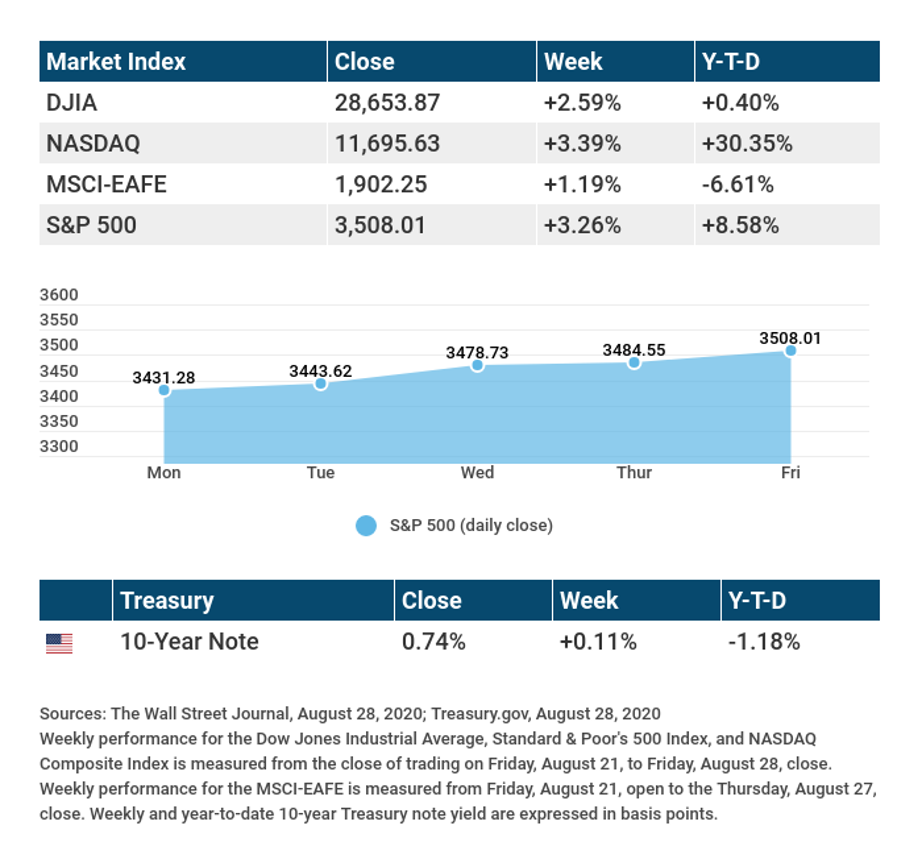In this week’s recap: Stocks power higher, while the Dow makes a few changes.
Weekly Economic Update
Presented by Craig Moore, August 31, 2020
THE WEEK ON WALL STREET
Stocks advanced relentlessly last week on positive COVID-19 developments, encouraging economic data, and a supportive policy shift in the Fed’s approach to its target inflation rate.
The Dow Jones Industrial Average increased by 2.59%, while the Standard & Poor’s 500 jumped 3.26%. The Nasdaq Composite index leaped 3.39% for the week. The MSCI EAFE index, which tracks developed overseas stock markets, rose 1.19%.1-3
Stocks Power Higher
Investors pushed stock prices higher all week as hopeful news came with each new day, from the announcement of a potential treatment for COVID-19 to news that U.S. and China negotiators had met by videoconference. Despite another high new jobless claims number, other economic data released during the week indicated a continuing economic recovery, further supporting investor enthusiasm for stocks.4
The Fed’s announcement of a shift in its inflation policy, which suggested that rates are likely to remain low for a long time, helped push the market higher. The momentum carried over into Friday, leaving the S&P 500 and NASDAQ Composite at new record highs and the Dow Jones in positive year-to-date territory.5
Changes in the Dow Industrials
It was announced last week that the Dow Jones Industrial Average will be undergoing some changes. Starting Monday, August 31, Salesforce.com, Amgen, and Honeywell International will be added to the 30 stocks in the Dow Industrials and Exxon Mobil, Pfizer, and Raytheon Technologies will be removed.6
In part, these changes were prompted by Dow-component Apple, which plans a four-to-one stock split on Monday, August 31. The Dow Jones Industrial Average is a price-weighted index, and Apple’s split reduces the impact of technology on the index. The new changes are an attempt to mitigate that issue.7
T I P O F T H E W E E K
Establish a timeline for your financial goals. List what you want to achieve and when, and review your progress and the deadlines you have set semi-annually or annually.
THE WEEK AHEAD: KEY ECONOMIC DATA
Tuesday: ISM (Institute of Supply Management) Manufacturing Index.
Wednesday: ADP (Automated Data Processing) Employment Report. Factory Orders.
Thursday: Jobless Claims. ISM (Institute of Supply Management) Services Index.
Friday: Employment Situation Report.
Source: Econoday, August 28, 2020
The Econoday economic calendar lists upcoming U.S. economic data releases (including key economic indicators), Federal Reserve policy meetings, and speaking engagements of Federal Reserve officials. The content is developed from sources believed to be providing accurate information. The forecasts or forward-looking statements are based on assumptions and may not materialize. The forecasts also are subject to revision.
THE WEEK AHEAD: COMPANIES REPORTING EARNINGS
Monday: Zoom Video (ZM).
Wednesday: Macy’s (M), Cloudera, Inc. (CLDR), Mongodb (MDB), Crowdstrike Holdings (CRWD).
Thursday: Broadcom (AVGO), Docusign (DOCU).
Source: Zacks, August 28, 2020
Companies mentioned are for informational purposes only. It should not be considered a solicitation for the purchase or sale of the securities. Investing involves risks, and investment decisions should be based on your own goals, time horizon, and tolerance for risk. The return and principal value of investments will fluctuate as market conditions change. When sold, investments may be worth more or less than their original cost. Companies may reschedule when they report earnings without notice.
Q U O T E O F T H E W E E K
“Wisdom is found only in truth.”
JOHANN WOLFGANG VON GOETHE

T H E W E E K L Y R I D D L E
There is a kind of sweet bean that never grows in a garden. What is it?
LAST WEEK’S RIDDLE: A man jumped out of a small plane without a parachute. When he hit the ground, he wasn’t injured at all. Why?
ANSWER: The plane was parked on the ground.
Investing involves risks, and investment decisions should be based on your own goals, time horizon, and tolerance for risk. The return and principal value of investments will fluctuate as market conditions change. When sold, investments may be worth more or less than their original cost.
The forecasts or forward-looking statements are based on assumptions, may not materialize, and are subject to revision without notice.
The market indexes discussed are unmanaged, and generally, considered representative of their respective markets. Index performance is not indicative of the past performance of a particular investment. Indexes do not incur management fees, costs, and expenses. Individuals cannot directly invest in unmanaged indexes. Past performance does not guarantee future results.
The Dow Jones Industrial Average is an unmanaged index that is generally considered representative of large-capitalization companies on the U.S. stock market. Nasdaq Composite is an index of the common stocks and similar securities listed on the Nasdaq stock market and is considered a broad indicator of the performance of technology and growth companies. The MSCI EAFE Index was created by Morgan Stanley Capital International (MSCI) and serves as a benchmark of the performance of major international equity markets, as represented by 21 major MSCI indexes from Europe, Australia, and Southeast Asia. The S&P 500 Composite Index is an unmanaged group of securities that are considered to be representative of the stock market in general.
U.S. Treasury Notes are guaranteed by the federal government as to the timely payment of principal and interest. However, if you sell a Treasury Note prior to maturity, it may be worth more or less than the original price paid. Fixed income investments are subject to various risks including changes in interest rates, credit quality, inflation risk, market valuations, prepayments, corporate events, tax ramifications and other factors.
International investments carry additional risks, which include differences in financial reporting standards, currency exchange rates, political risks unique to a specific country, foreign taxes and regulations, and the potential for illiquid markets. These factors may result in greater share price volatility.
Please consult your financial professional for additional information.
This content is developed from sources believed to be providing accurate information. The information in this material is not intended as tax or legal advice. Please consult legal or tax professionals for specific information regarding your individual situation. This material was developed and produced by FMG Suite to provide information on a topic that may be of interest. FMG is not affiliated with the named representative, financial professional, Registered Investment Advisor, Broker-Dealer, nor state- or SEC-registered investment advisory firm. The opinions expressed and material provided are for general information, and they should not be considered a solicitation for the purchase or sale of any security.
Copyright 2020 FMG Suite.
CITATIONS:
- The Wall Street Journal, August 28, 2020
2. The Wall Street Journal, August 28, 2020
3. The Wall Street Journal, August 28, 2020
4. CNBC.com, August 27, 2020
5. CNBC.com, August 27, 2020
6. The Wall Street Journal, August 24, 2020
7. CNBC, August 20, 2020
CHART CITATIONS:
The Wall Street Journal, August 28, 2020
The Wall Street Journal, August 28, 2020
treasury.gov, August 28, 2020
